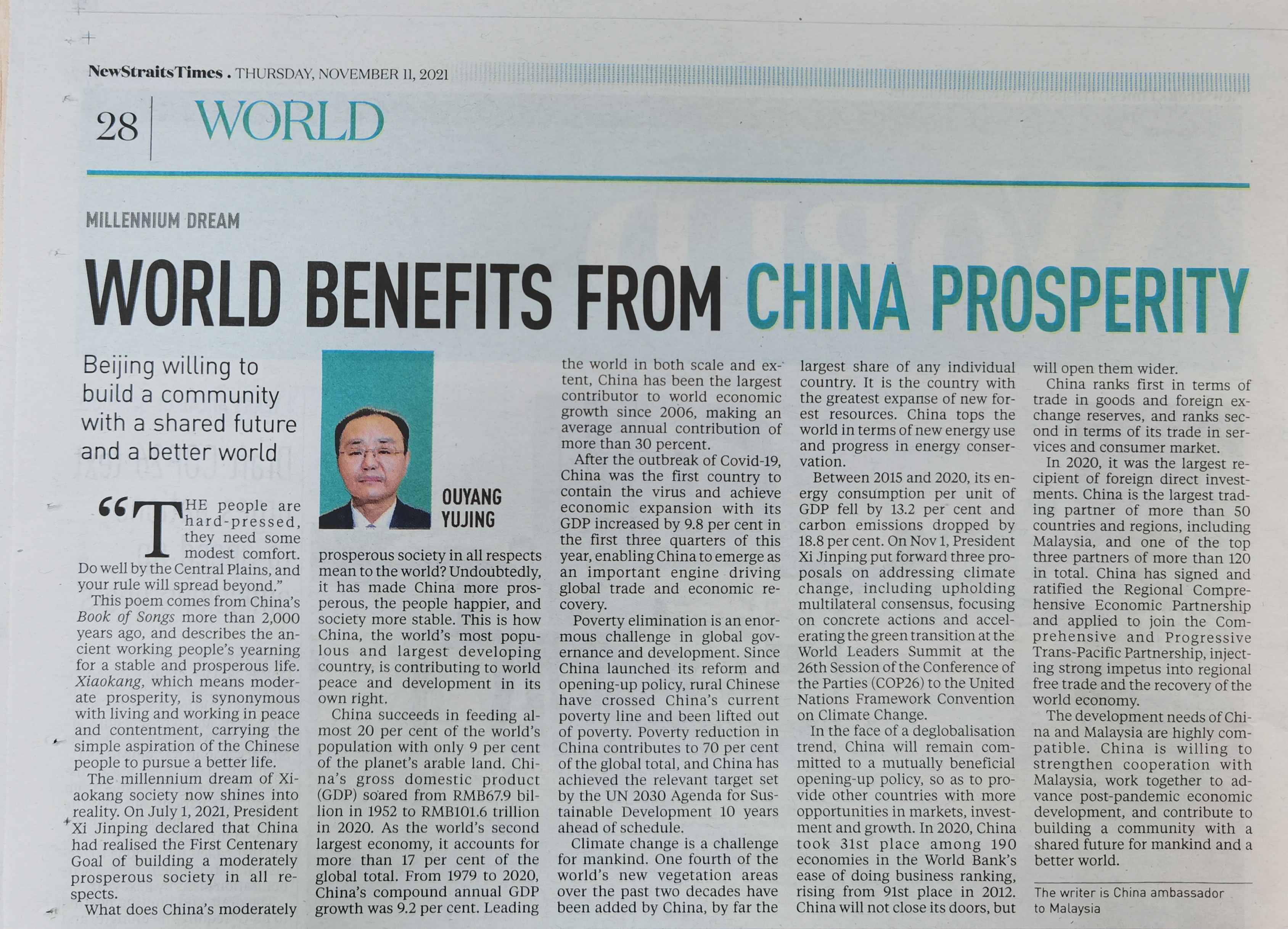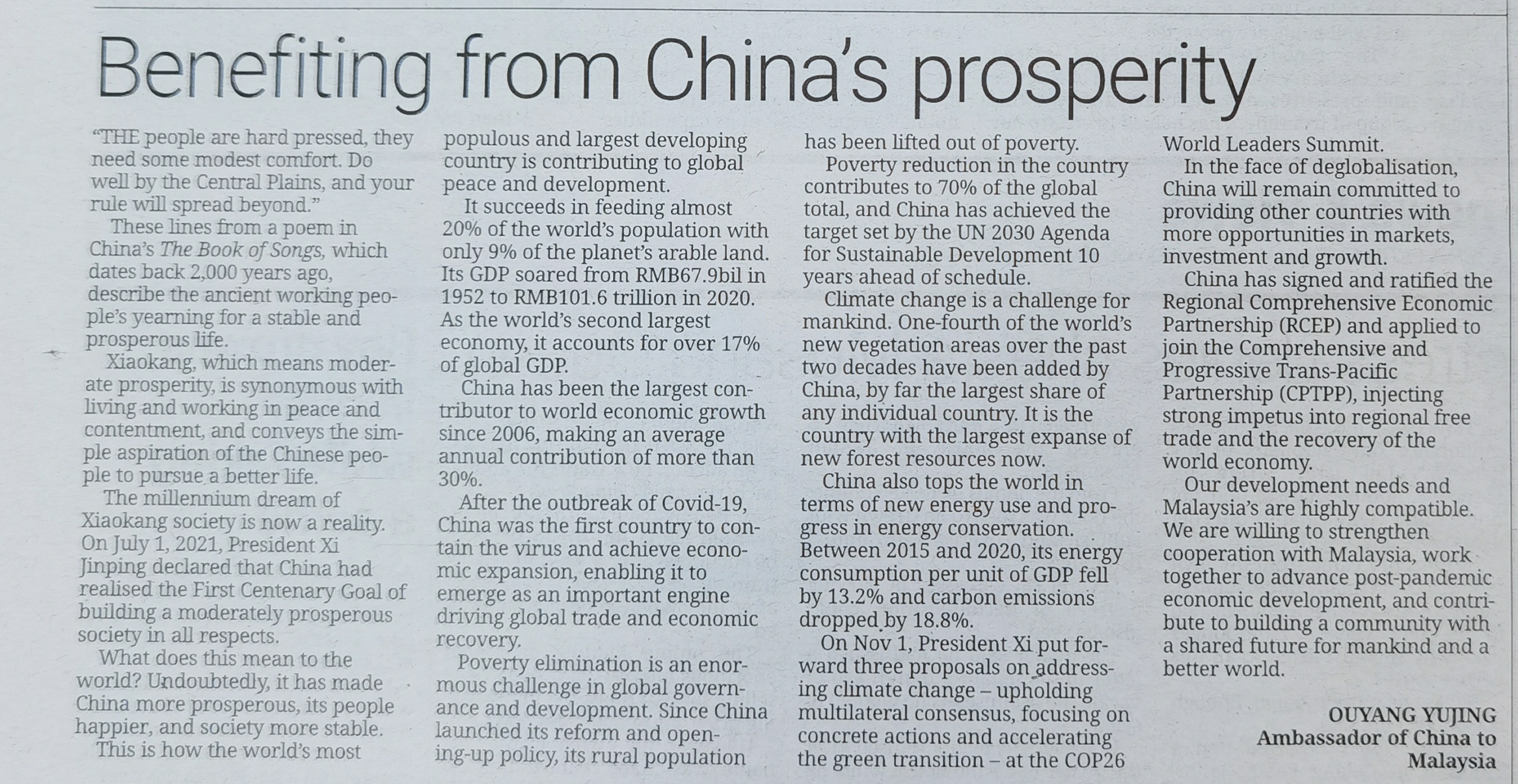“The people are hard-pressed, they need some modest comfort. Do well by the Central Plains, and your rule will spread beyond.”
This poem comes from China's Book of Songs more than two thousand years ago, and describes the ancient working people's yearning for a stable and prosperous life. Xiaokang, which means moderate prosperity, is synonymous with living and working in peace and contentment, carrying the simple aspiration of the Chinese people to pursue a better life.
The millennium dream of Xiaokang society now shines into reality. On July 1, 2021, President Xi Jinping declared that China had realized the First Centenary Goal of building a moderately prosperous society in all respects.

What does China's moderately prosperous society in all respects mean to the world? Undoubtedly, it has made China more prosperous, the people happier, and society more stable. This is how China, the world’s most populous and largest developing country, is contributing to world peace and development in its own right.
China succeeds in feeding almost 20 percent of world population with only 9 percent of the planet’s arable land. China’s GDP soared from RMB67.9 billion in 1952 to RMB101.6 trillion in 2020. As the world’s second largest economy, it accounts for over 17 percent of the global total. From 1979 to 2020, China’s compound annual GDP growth was 9.2 percent. Leading the world in both scale and extent, China has been the largest contributor to world economic growth since 2006, making an average annual contribution of more than 30 percent.
After the outbreak of Covid-19, China was the first country to contain the virus and achieve economic expansion with its GDP increased by 9.8% in the first three quarters of this year, enabling China to emerge as an important engine driving global trade and economic recovery.
Poverty elimination is an enormous challenge in global governance and development. Since China launched its reform and opening-up policy, rural Chinese have crossed China’s current poverty line and been lifted out of poverty. Poverty reduction in China contributes to 70 percent of the global total, and China has achieved the relevant target set by the UN 2030 Agenda for Sustainable Development 10 years ahead of schedule.
Climate change is a challenge for mankind. One fourth of the world’s new vegetation areas over the past two decades have been added by China, by far the largest share of any individual country. It is the country with the greatest expanse of new forest resources. China tops the world in terms of new energy use and progress in energy conservation. Between 2015 and 2020, its energy consumption per unit of GDP fell by 13.2 percent and carbon emissions dropped by 18.8 percent. On November 1, President Xi Jinping put forward three proposals on addressing climate change including upholding multilateral consensus, focusing on concrete actions and accelerating the green transition at the World Leaders Summit at the 26th Session of the Conference of the Parties (COP26) to the United Nations Framework Convention on Climate Change (UNFCCC).
In the face of a deglobalization trend, China will remain committed to mutually beneficial opening-up policy, so as to provide other countries with more opportunities in markets, investment and growth. In 2020, China took 31st place among 190 economies in the World Bank’s ease of doing business ranking, rising from 91st place in 2012. China will not close its doors but will open them wider.
China ranks first in terms of trade in goods and foreign exchange reserves, and ranks second in terms of its trade in services and consumer market. In 2020, it was the largest recipient of foreign direct investment. China is the largest trading partner of more than 50 countries and regions including Malaysia, and one of the top three partners of over 120 in total. China has signed and ratified the Regional Comprehensive Economic Partnership (RCEP) and applied to join the Comprehensive and Progressive Trans-Pacific Partnership (CPTPP), injecting strong impetus into regional free trade and the recovery of the world economy.
The development needs of China and Malaysia are highly compatible. China is willing to strengthen cooperation with Malaysia, work together to advance post-pandemic economic development, and contribute to building a community with a shared future for mankind and a better world.
